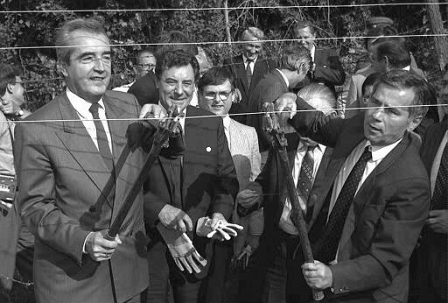Erstellt am: 21. 8. 2009 - 14:42 Uhr
Memories of 1989
1989-2009
Der Schwerpunkt auf FM4
1989 - A year which began with Vaclav Havel in a Czechoslovak jail and people still being shot along the Berlin Wall (with East German leader Erich Honecker proclaiming the wall would stand for another 100 years) miraculously ended with Havel the president of a democratic Czechoslovakia, the Berlin Wall breached and crumbling, and Honecker out of power and on the run.
A pivotal point in that year came in August of 1989 when Hungarian border guards allowed East Germans vacationing in Hungary to go west, let them enter Austria unhindered, and to new lives in western Germany (and elsewhere). Most Austrians, like everyone else, were caught a bit off-guard.
West German diplomats, led by their very capable foreign minister, Hans-Dietrich Genscher, quickly organized shelter and transportation to temporary camps for the refugees in West Germany.
I traveled to Burgenland shortly after the exodus of East Germans in the summer. Most people were pleased and happy that tensions along the border had eased to the point that in June of 1989 Austrian Foreign Minister Alois Mock and his Hungarian counterpart, Gyula Horn, had symbolically cut the barbed wire fence along the border. This symbolic act had actual consequences as it led to the organization of an event known as the Pan-European Picnic, which was held close to the border, and which East German vacationers were urged to attend. Leaflets promoting the event were distributed around Lake Balaton, a favoured destination of East German tourists.

APA FILES Fotograf: Robert Jaeger
From Vienna ...
As 1989 proceeded, and as the Iron Curtain continued to fall, not everyone in Austria was happy about what was rapidly becoming an end of an era. Many Austrians had long been accustomed to being “the edge of the West”, a place of political stability, prosperity, and relative isolation from the outside world. Where many people saw 1989 as the end of a divided Europe and a new era of freedom for Central and Eastern Europe, others were fearful at the changes this new era would bring. There were fears “die Wende” would bring an influx of unwelcome foreigners, criminality and instability. Right-wing extremists tried to tap into these fears for political gain and were partially successful (see Carinthia; Haider, Jörg). I knew of one Viennese businessman, a man whose family’s roots were in Bohemia and Moravia. This man, not exactly the generous sort, had his doorbell disconnected on the off chance an unwelcome long-lost Czechoslovak cousin might turn up unexpected on his doorstep.
Conversely, I also saw examples of people acting generously and welcoming the changes which the events of 1989 were bringing. I was in a record shop in the first district when the cashier apprehended a shoplifter. The shoplifter was a well-to-do, well-dressed Viennese man of about 55 years of age. The cashier stood by as the man was prevented from escaping by two young shop assistants. The thief rather lamely explained that he had “intended” to pay for the CDs he had hidden in his coat. The man then handed over the money for the CDs he had been intent on stealing. Once the CDs had been paid for, the cashier asked if there was anyone in the shop from eastern Europe. A young couple stepped forward wearing Soviet-quality clothing and the plastic “moonboots” which all Czechs and Slovaks seemed to be wearing that winter. The cashier then promptly gave the couple both the almost-stolen CDs and the money the thief had eventually handed over. The would-be thief looked at this with disbelief, while the cashier told him that he would not be getting off that easily and that the police would be arriving shortly.
... to Berlin
I saw similar acts of generosity in November of 1989, about ten days after the Wall had been breached. I had taken a train from Vienna to Berlin, but mistakenly got off the train early on the edge of the border between East and West Berlin. On the train I had fallen into conversation with three young men from Dresden who had never before been in the West. From the train station we had to walk across a foggy field to pass border controls to enter West Berlin. In the fog I saw ghostly figures walking eastward carrying electronics, sacks of bananas, and other products unavailable to average people in “the first German state for peasants and workers”. After crossing the checkpoints we found ourselves in suburban West Berlin. The three East Germans marveled at the homes and the cars. They asked me if it was all real or if it was some kind of propaganda to impress the “communist foe”. I assured them it was all real. We made our way into the heart of West Berlin, where the trio from Dresden were welcomed as brothers in several bars that night and where all their drinks were paid for by West Berliners who were euphoric that the division of their city, their country, and the continent was coming into view.
There has been much talk recently of the "losers" of 1989, the de-populated eastern German towns and villages, the rise of right-wing organizations in the former Soviet bloc, xenophobic violence, etc. Granted, these are all problems which must be dealt with, but to argue that life would have been better if the Cold War had remained frozen is as misguided and myopic as the regimes and ideologies which the events of 1989 replaced.


